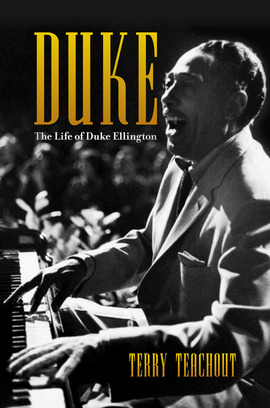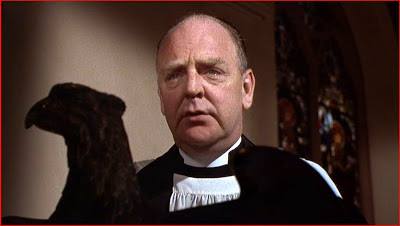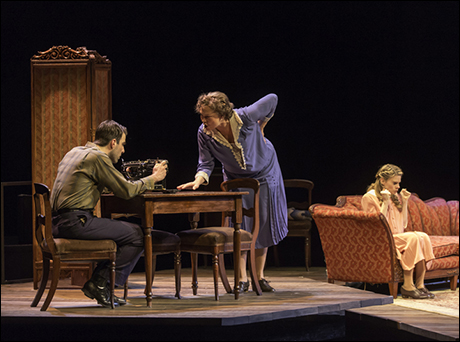 The good news about Duke: A Life of Duke Ellington continues to roll in, including one piece of information that I should have passed on some time ago. I didn’t mention it in this space because–to be perfectly honest–it slipped my mind, but Duke, much to my delight, already has a British publisher. The Robson Press will be bringing it out on Oct. 24. Same title and text, different dust jacket. No word yet on foreign-language versions, but I’ll be letting you know about those in due course.
The good news about Duke: A Life of Duke Ellington continues to roll in, including one piece of information that I should have passed on some time ago. I didn’t mention it in this space because–to be perfectly honest–it slipped my mind, but Duke, much to my delight, already has a British publisher. The Robson Press will be bringing it out on Oct. 24. Same title and text, different dust jacket. No word yet on foreign-language versions, but I’ll be letting you know about those in due course.
For more information about the British edition of Duke, go here.
Archives for September 27, 2013
TT: The one that got away
In today’s Wall Street Journal drama column I review two important New York revivals, the off-Broadway production of William Inge’s Natural Affection and the Broadway production of Tennessee Williams’ The Glass Menagerie. Here’s an excerpt.
* * *
 William Inge wrote four straight Broadway hits, followed by three straight flops. Seven years after the last flop closed, he killed himself. It took three decades before his reputation began to recover from the effects of his back-to-back failures. That’s the saddest theater story I know, and it gets sadder: TACT/The Actors Company Theatre has just given “Natural Affection,” Inge’s second flop, its first New York revival, and it turns out to be a play of real quality, one that the critics of 1963 simply didn’t understand. That’s not just sad–it’s a crime.
William Inge wrote four straight Broadway hits, followed by three straight flops. Seven years after the last flop closed, he killed himself. It took three decades before his reputation began to recover from the effects of his back-to-back failures. That’s the saddest theater story I know, and it gets sadder: TACT/The Actors Company Theatre has just given “Natural Affection,” Inge’s second flop, its first New York revival, and it turns out to be a play of real quality, one that the critics of 1963 simply didn’t understand. That’s not just sad–it’s a crime.
One outraged newspaper reviewer complained about the “cheap crudities” and “sensual sensationalism” of “Natural Affection.” While neither charge is true, it’s easy enough to see why Inge’s tale of an unhappy single mother from Chicago (Kathryn Erbe) and her emotionally disturbed son (Chris Bert) was so hard for critics and playgoers to take. Among other things, “Natural Affection” deals with adultery, alcoholism, child abuse, homosexuality, incest and murder. Nowadays such topics are old hat, and there’s nothing gratuitous about the way in which they’re portrayed here–but at a time when “The Beverly Hillbillies” was still America’s favorite TV show, it was not merely daring but downright reckless to cram all of them into a single evening. Worse yet, Inge had taken care in his stage hits, “Bus Stop” and “Picnic” in particular, to leaven his characters’ despair with glimmers of hope. Not this time: Here the curtain falls on a tableau as bleak as the inside of a gas chamber.
Strong stuff, in short, and in a less well judged production, “Natural Affection” could easily come off sounding excessive. But Jenn Thompson, who directed TACT’s perception-changing 2012 revival of Neil Simon’s “Lost in Yonkers,” has staged it with an understated simplicity that keeps the horrors in proportion…
 “The Glass Menagerie,” which rivals “Our Town” as the finest of all American plays, was ill served by David Leveaux’ 2005 Broadway staging, a tone-deaf embarrassment redeemed only by Sarah Paulson’s lyrical performance as Laura. Now Cambridge’s American Repertory Theatre has exported its much-praised revival, directed by John Tiffany (“Once”) and starring Cherry Jones and Zachary Quinto, both of whom received hats-off out-of-town reviews. I see why they got them–but I respectfully dissent.
“The Glass Menagerie,” which rivals “Our Town” as the finest of all American plays, was ill served by David Leveaux’ 2005 Broadway staging, a tone-deaf embarrassment redeemed only by Sarah Paulson’s lyrical performance as Laura. Now Cambridge’s American Repertory Theatre has exported its much-praised revival, directed by John Tiffany (“Once”) and starring Cherry Jones and Zachary Quinto, both of whom received hats-off out-of-town reviews. I see why they got them–but I respectfully dissent.
The trouble starts with Mr. Quinto, who plays Tom, Williams’ not-very-fictional alter ego, in a loud-voiced, explicitly campy manner that I suspect was modeled on the public demeanor of the author himself. Yes, Tom is gay, and it makes good dramatic sense to play him that way, as Patch Darragh did (if far more subtly) in the Roundabout Theatre Company’s brilliant 2010 Off-Broadway revival. But Mr. Quinto’s mile-wide characterization inevitably competes for attention with Ms. Jones’ similarly showy performance as Amanda, the smothering mother who fears for her children’s future yet cannot set them free to face the world. It’s not that Ms. Jones is anything other than a stage actress of the first rank, one of the best we have. But she plays Amanda all the way up to the hilt, flinging her arms around like a pair of fire hoses and putting on a double-stuffed southern accent that sounds as though her upper plate had come loose. Between her and Mr. Quinto, you can barely see the play for the acting….
* * *
Read the whole thing here.
The trailer for Natural Affection:
TT: Putin and the petition
In today’s Wall Street Journal “Sightings” column I discuss Vladimir Putin, homosexuality, and the Metropolitan Opera. Here’s an excerpt.
* * *
 It’s come to the belated attention of New York’s opera lovers that Vladimir Putin is a thug. Russia’s dictator-in-waiting recently signed a stack of laws whose purpose is to persecute homosexuals. Needless to say, Mr. Putin’s odious conduct, not only toward gays but toward anyone who dares to disagree with him, isn’t exactly stop-press news to those who’ve followed his career, but it was the anti-gay legislation that pushed Andrew Rudin, a gay classical composer from New Jersey, over the line. Mr. Rudin responded by posting an online petition calling for the Metropolitan Opera to dedicate its opening-night performance, which took place on Monday, to the “support” of gays in Russia and elsewhere.
It’s come to the belated attention of New York’s opera lovers that Vladimir Putin is a thug. Russia’s dictator-in-waiting recently signed a stack of laws whose purpose is to persecute homosexuals. Needless to say, Mr. Putin’s odious conduct, not only toward gays but toward anyone who dares to disagree with him, isn’t exactly stop-press news to those who’ve followed his career, but it was the anti-gay legislation that pushed Andrew Rudin, a gay classical composer from New Jersey, over the line. Mr. Rudin responded by posting an online petition calling for the Metropolitan Opera to dedicate its opening-night performance, which took place on Monday, to the “support” of gays in Russia and elsewhere.
Part of made the petition so interesting was its occasion, which was uncommonly timely. It so happened that the Met opened its season with a new production of “Yevgeny Onegin,” an opera by Tchaikovsky, who was both Russian and gay (though Vladimir Medinsky, Putin’s culture minister, denies the latter, absurdly claiming that “there is no evidence that Tchaikovsky was a homosexual”). Moreover, the performance featured two well-known Russian artists, the conductor Valery Gergiev and the soprano Anna Netrebko, both of whom are unabashed and enthusiastic Putin supporters.
About 9,000 people signed the petition, including Bartlett Sher, one of the Met’s best-known stage directors. But Peter Gelb, the Met’s general manager, declined to go along with their request. “As an institution, the Met deplores the suppression of equal rights here or abroad,” he said in a written statement. “But since our mission is artistic, it is not appropriate for our performances to be used by us for political purposes, no matter how noble or right the cause.” Not surprisingly, protests followed, both outside and inside the Metropolitan Opera House.
Who got it right? And what should happen next?
To begin with, I’m all for the picketers–though not the protesters who disrupted the opening-night performance, a piece of behavior that was anti-artistic and counterproductive. In addition, I also favor continued efforts to put the squeeze on Mr. Gergiev and Ms. Netrenko….
* * *
Read the whole thing here.
TT: Almanac
“If there is any test that can be applied to movies, it’s that the good ones never make you feel virtuous.”
Pauline Kael, “Ersatz”
